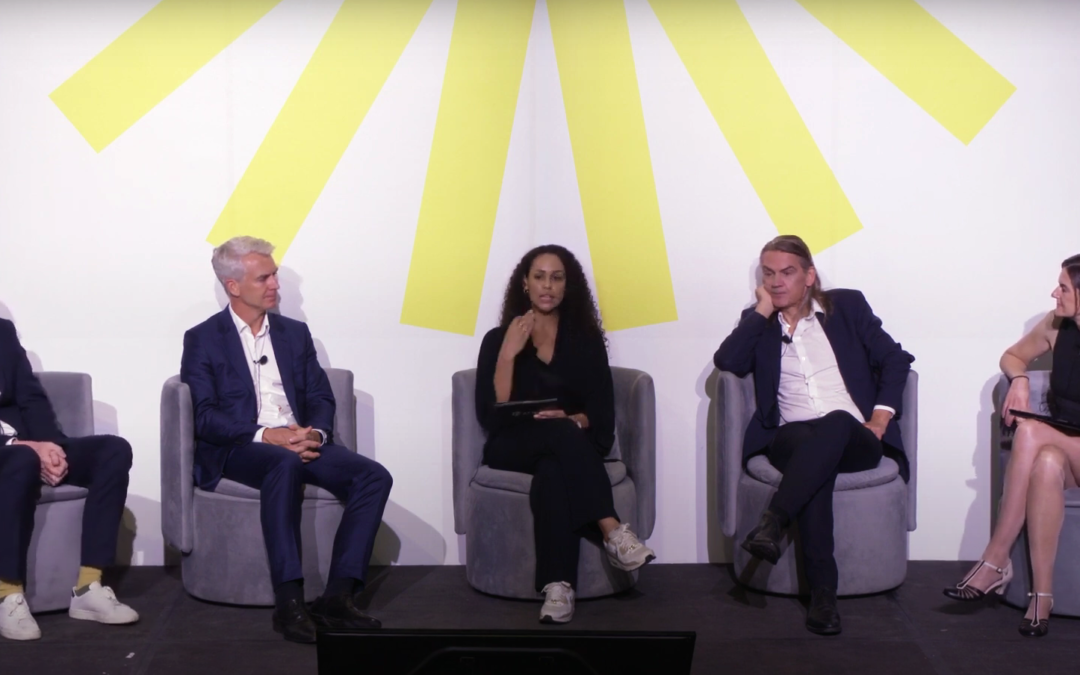Professional services, encompassing fields such as engineering, IT consulting, media and strategic advisory roles, may not traditionally bear significant direct emissions within their value chains. However, their influence is profound; these firms have the unique capability to drive environmental progress through client engagement, project selection and strategic alignment with 1.5°C climate targets.
As part of Climate Week NYC 2024, the Exponential Roadmap Initiative, in collaboration with Solutions House gathered experts together to explore the vital role that consultancy and professional services can play in accelerating the shift towards a sustainable, net zero future.
Launch of the Professional Services Matrix
Jane Eisenhardt, Engagement and Acceleration Manager at the United Nations Race to Zero, described the coalition’s work uniting non-state actors in the global push to halve emissions by 2030 and reach net zero by 2050. This year, with a key focus on integrating professional service providers into climate action, recognising their significant role in shaping climate strategies and client decisions. Jane Eisenhardt:
One of the reasons it’s really special working in a coalition, is as conveners, we really get to sit in a special place of bringing people together to dive into new issue areas and really work on the system unlocks and the net zero space. We get to pull in all of the experts, the practitioners, those on the ground and really tackle new emerging issue areas; professional service providers being one of them.
The recent launch of the Professional Services Matrix, developed by the Exponential Roadmap Initiative, with key contributors AFRY and Futerra, provides a tangible, actionable framework for service providers to operationalise climate goals and embed sustainable practices into their work.
Aligning client projects with 1.5 C climate goals
Sara Lindstrand, Director of Sustainability at AFRY, detailed the company’s proactive efforts to integrate the newly launched Professional Services Matrix into their work, aiming to align client projects with 1.5 C climate goals. Sara Lindstrand:
To make sure that we’re aligning the way we work, also what type of projects we run and addressing climate change through the projects that we have, we know that we want to find a way to measure and visualise how well we are positioning ourselves and these different technologies, and also for clients that aren’t 1.5 aligned. So, this is really where the matrix, comes into play.
AFRY began by applying the matrix to their top 100 clients, representing 40% of net sales, to assess alignment with climate targets. This underscored areas for improvement, such as enhancing project categorisation and exploring options for external data sources to refine alignment assessments, with the ultimate goal of automating the process for broader implementation.
Henrik Tegnér, Head of Strategy at AFRY, acknowledged that while AFRY would not directly classify clients within specific lines of the matrix, the tool provides an opportunity for constructive dialogue. Henrik Tegnér:
Many of the clients that we work with have an ambition to actually move upwards in this matrix. So, I think it could be quite a good discussion with them, because of course, if we work with someone who is now not 1.5 aligned, but we work on projects that are to the right in this matrix, over time they will, for sure, move upwards right and become 1.5 aligned. I think it can be quite the interesting discussion.
Andrew Wanliss-Orlebar, Chief Strategy Officer for Futerra, shared the unique approach Futerra takes as a small, purpose-driven business navigating sustainability within the professional services landscape. Wanliss-Orlebar underscored the importance of simplicity in adopting sustainable practices, especially for smaller enterprises like Futerra, which focuses on solutions and storytelling to inspire positive change.
Reflecting on their partnership with the Professional Services Matrix, he explained how it has bolstered Futerra’s internal processes by aligning with existing governance principles. Andrew Wanliss-Orlebar:
We’ve turned down clients for years if we felt they weren’t aligned with what we were doing, but sometimes it was about the client, sometimes it was about the project. So, in some ways, this helps us articulate even more clearly where the hitch is. Also I think what’s great about it, is it’s a tool for improvement. There’s maybe a little bit of pass/fail in here, but beyond that, it’s an opportunity to canvas for innovation and expansion.
The Professional Services Matrix aims to be a transformative tool for companies aiming to advance climate goals, not only in their own operations but also in the work they do with clients and partners.


